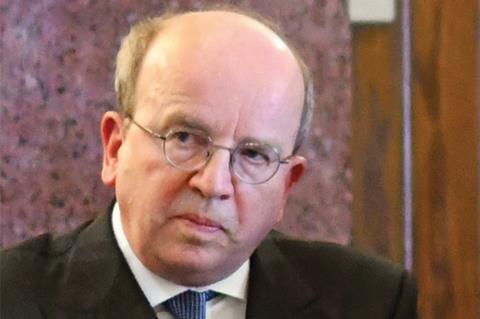In the wake of London International Disputes Week, Joanna Goodman reports on emerging trends affecting the capital’s pre-eminent status as a global legal hub
The low down
It is harvest time for commercial litigators. An increase in national and international disputes has been fuelled by global instability and the war in Ukraine. Litigation funding is enabling the pursuit of more and more cases. And environment-focused litigation is on the rise too. Brexit emboldened London’s rival disputes centres and the competition is real – taking advantage of the UK’s exclusion from the Lugano Convention. But a global disputes ‘framework’ is making progress. Competition and challenge, some observe, is keeping London on its toes.
Big-ticket civil litigation is counter-cyclical. It is therefore unsurprising that geopolitical instability and economic upheaval have led to an uptick in national and international disputes being heard in UK courts. This has been buoyed by the ready availability of litigation funding. Moves toward mutual recognition and enforcement of judgments post-Brexit have led to optimism about a future global framework for best practice in dispute resolution, and integration between international systems and procedures.
London calling
The London Solicitors Litigation Association’s (LSLA) latest annual litigation trends survey of its 3,700 members (which covers the 12 months to November 2022) reflects continuing confidence in the London litigation market: 54% of respondents thought the litigation market had grown, while 28% thought it was the same as the previous year. Looking ahead, 61% expect it to grow over the next 24 months and 22% expect it to be similar.
The survey reflected the general view that the London litigation market continues to thrive, notwithstanding challenges arising from Brexit and the Ukraine conflict. Indeed, 82% of respondents had not experienced a material loss of work. And of the 18% who had, this mostly went to arbitration rather than an alternative destination. A few cases had gone to Amsterdam and Paris courts which have the capacity to hear cases in English, although disputes in Paris are predominantly francophone.
Portland Communications’ Commercial Courts Report 2023 underlines London’s continuing status as a leading global centre for civil litigation. It reported a 10% increase in the number of judgments handed down and a 23% increase in the number of litigants, including the highest proportion of EU litigants since 2018. While 60% of litigants were from outside the UK, the report also observed that ‘this is the first year an EU member state has not featured in the top five litigant nationalities’. The top three nationalities of litigants after the UK were the US, Russia and Singapore.
'The landscape is changing when it comes to resolving disputes. Litigation isn’t the only option. Arbitration and mediation are an important part of [London’s] offering'
Johnny Shearman, Greenberg Traurig
The increase in Russian litigants (41%), a year after the invasion of Ukraine, is partly explained by challenges arising from the effects of sanctions in respect of new and ongoing cases. The number of Singaporean litigants appearing in the London Commercial Court soared by 240%. The Singapore International Commercial Courts saw a reduction in litigant numbers; Singapore has continued to invest in alternative forms of dispute resolution, notably establishing a protocol for collaboration with the Singapore International Mediation Centre.
London is equally focused on mediation and arbitration. Johnny Shearman, dispute resolution knowledge lawyer at Greenberg Traurig in London, observes: ‘It is fair to say the landscape is changing when it comes to resolving disputes. Litigation isn’t the only option. Arbitration and mediation are an important part of this jurisdiction’s offering – the UK ratifying the Singapore Convention on Mediation will bolster this further.’
So far, 55 countries have signed the Singapore Convention, which is a framework for international settlement agreements resulting from mediation. Shearman sees competition between global dispute hubs as ‘a good thing …ensuring that London isn’t resting on its laurels’. He highlights technology and the ability to conduct hearings remotely as another source of London’s competitive advantage. ‘During the global pandemic, the Commercial Court in particular was decisive in its approach to remote and hybrid hearings. It meant it could continue to sit and we’re seeing that technology being deployed post-pandemic,’ he adds.
Helen Dodds, director of LegalUK and former global head of legal, dispute resolution at Standard Chartered Bank, spoke to Burford Capital’s Michael Redman at last week’s annual London International Disputes Week. She highlighted London’s legal ecosystem as an important factor in its position as a leading centre for dispute resolution – in addition to English language and English law underpinning most commercial contracts and the quality of the courts and judiciary. She referred to ‘the agglomeration effect, which is basically the breadth and depth of legal support services that are available in London to serve those who are litigating. By this I mean expert witnesses and the organisations that work with them, forensic experts, lawtech and legal technology, and… a deep bench of litigation funders… including Burford Capital’.

Financing boost for class actions
Assets held by the 15 largest UK litigation funders hit £2.2bn in 2022, an 11% increase on the previous year, according to RPC. Litigation funders are increasingly looking to fund cross-border class actions, which can result in large damages awards. A UK class action related to the VW ‘dieselgate’ litigation settled for £193m. Portland Communications’ Class Action Report 2022 investigated public attitudes towards class actions in the UK and the US. It found that 60% of respondents would be willing to join class actions if they were affected directly by a company’s allegedly illegal activity, especially against the energy (48%), finance (48%), technology (48%) and healthcare (48%) industries. The top category of interest was environmental claims, with 57% of respondents indicating that they would be likely to join a class action related to environmental damage. However, 28% of UK respondents would be less willing to participate in a class action over concerns about liability for legal costs.
Banking is another key area for class actions and litigation funders. RPC research revealed that the UK’s leading banks are facing class and group actions lawsuits across multiple jurisdictions, many of which are related to Libor and other interest rate and market manipulation.
‘Often the quantum of these cases against the banks is so significant that litigation funders are front of the queue to back these class and group actions,’ says RPC partner Daniel Hemming. ‘Litigation funders have the potential to shift the balance of power in favour of claimants in these kinds of cases. Banks and other large corporates can no longer rely on the prohibitive cost of these cases putting off potential claimants.’
European comity and competition
Notwithstanding London’s continued popularity, Brexit still casts a shadow in terms of increased bureaucracy regarding recognition and enforcement in EU countries. Mickaël Laurans is head of international at the Law Society of England and Wales, which has lobbied (so far unsuccessfully) for the UK to rejoin the Lugano Convention. ‘While the EU take the view that [Lugano] is a single market instrument, we disagree,’ he explains. He adds that while this is a bureaucratic inconvenience for parties to large-scale commercial disputes and their lawyers, post-Brexit it is also harder and more complex for smaller businesses, consumers and families to seek redress – and more costly, especially if they need legal advice from lawyers in more than one jurisdiction.
Fortunately, the UK’s decision to accede to Hague 19, which has not yet been lodged, will make mutual recognition of judgments easier, although it is narrower in scope than the Lugano Convention. Laurans believes that the UK’s involvement in international alliances outside the EU, such as the Singapore Convention on Mediation and the Standing International Forum of Commercial Courts (SIFoCC), are indications of the UK’s ambition to remain a global leader in international law and a centre for collective redress.
'The regulators were practically dormant throughout Covid and it has taken time for the Financial Conduct Authority and Prudential Regulation Authority to reignite. We are already seeing a steady flow of decisions'
Elizabeth Williams, Simmons & Simmons
While Brexit has complicated the mutual recognition and enforcement of decisions and judgments, recent months have seen increased cooperation between what were initially seen as competing forums. ‘The London Commercial Court and arbitral courts have been supported by helpful outcomes from European courts on matters of jurisdiction,’ observes Elizabeth Williams, litigation partner at Simmons & Simmons. She highlights a recent ruling by an Amsterdam court overseeing follow-on litigation against the EU forex cartel. It was found that the court only has jurisdiction over the three plaintiffs domiciled in the Netherlands, and not the other 28 claimants who are based abroad (known as the ‘Stichting Forex Claim’).

‘This is helpful because it shows that there are barriers to parties trying to forum shop, but it is an argument that will play out in each European court as to how willing or able they are (as a matter of civil law) to take on these cases,’ she explains. ‘Because of its precedent-setting nature, the claim will most likely go to the European Court of Justice. This often sets a helpful blueprint of how these claims will be managed by any other court that is also bound by ECJ jurisprudence.’ The case is a pioneering instance of a continental European court reacting to claimants seeking to forum shop their claims in Europe to try to achieve the best outcome.
Williams also highlights the link between adverse findings of a regulator against institutions and subsequent litigation, particularly class actions: ‘The regulators were practically dormant throughout Covid and it has taken time for the Financial Conduct Authority and Prudential Regulation Authority to reignite. We are already seeing a steady flow of decisions.’
'Everyone is keen to avoid a US culture around class actions… but if we want to remain at the forefront of these claims, we should have more robust legislation in this area'
Lucy Pert, Hausfeld
Hausfeld commercial disputes partner Lucy Pert, meanwhile, picked up on the limitations of the UK’s class action (opt-out) regime, which is only for competition law matters. There was talk of expanding it to shareholder actions but that has not happened. Outside competition law, claimants have to resort to group actions, which are opt-in only and can only be used in specific circumstances.
‘Although there are big cases coming up in London, we are a little behind the curve in terms of legislation and how easy it is to bring group actions. There is a more robust regime in Holland and legislation is being introduced that will require all European countries to have a mechanism for collective consumer redress,’ Pert says.
‘There are benefits to both sides of having a regime where the dispute is resolved in one place, and there’s finality, rather than having lots of separate actions. Of course everyone is keen to avoid a US culture around class actions… but if we want to remain at the forefront of these claims, we should have more robust legislation in this area.’
As class actions nearly always have to be funded, London’s well-established litigation funding market makes it an attractive destination. This is partly driven by the high cost of litigation, but some European jurisdictions are starting to catch up.
Rise of ESG litigation
The past year has seen developments in the types of case being heard in UK courts. The LSLA asked litigators to identify areas they expected to see more litigation. The top five responses were: class actions (73%); insolvency and business distress (72%); environmental, social and governance (ESG) (59%); supply chain disruption (53%); and fraud (50%).
ESG is a wide class of dispute, explains Nicholas Heaton, a partner at Hogan Lovells and president of the London LSLA. Many of the claims being brought in UK courts arise from the activities of multinationals in developing countries. Claimants often sue the parent company in the UK to establish responsibility for its subsidiaries abroad, rather than bring a claim in a developing country where the court systems are less accessible. There has also been an increase in emissions-related claims around greenwashing.
Portland found that overwhelming public support of climate litigation is a key driver for the increase in ESG cases: 81% of respondents agreed that UK courts should intervene if private companies are not delivering on climate goals; 86% agreed that companies should be made to pay damages if they fail to reduce their negative contribution to climate change; and 82% considered the increased number of companies being sued for greenwashing as a positive development.
These trends are also evident in the US, where there is a greater appetite for class actions. In October 2022, the SIFoCC discussed different jurisdictions’ regulations and activities around climate change and corporate social responsibility, and the relative maturity and influence of litigation funding markets.
Towards a global framework
While Brexit removed the automatic mutual recognition and enforcement of judgments between the UK and Europe, it highlighted the need for judicial comity across jurisdictions. Progress is being made towards a global framework for dispute resolution. Where this is being played out in a tangible way is in the SIFoCC. The most senior members of the commercial courts in 45 global jurisdictions, including more than half the G20, meet regularly to discuss themes such as judicial cooperation and challenges that courts face, with a view to sharing best practice. They asked each participating court to provide a guide on how to enforce decisions in their jurisdiction.
Mr Justice Robin Knowles has day-to-day responsibility for SIFoCC as a global forum. ‘We’ve tackled items across a spectrum, from sharing best practice principles in case management and creating the multilateral memorandum on enforcement, to developing a conversation about cross-border cooperation, and focusing on subject matters that feature significantly in commercial courts,’ he says. Most recently these have encompassed technology disputes involving crypto-assets and blockchain, and ESG disputes about climate change, as well as comparing notes on approaches to class actions and litigation funding.
'Commercial dispute resolution is a competitive place, but that doesn’t mean that there isn’t great value in sensible dialogue addressing shared problems and challenges'
Mr Justice Robin Knowles
The multilateral memorandum on enforcement involves the judiciaries of most SIFoCC members sharing intelligence enforcing each other’s judgments. ‘It’s meant that while treaties like Lugano are still important, it’s possible to achieve enforcement by other means,’ explains Knowles. He adds that this practical framework and guidance gives SIFoCC members confidence in reciprocity.

Knowles stresses that although the UK has lost some enforcement arrangements through Brexit, many other parts of the world did not have them anyway. He is encouraged too by the fact that France and Germany have joined SIFoCC, which is quickly becoming a framework for reciprocity. ‘These are examples of what can happen when one can bring different countries’ judiciaries to convene together and share problems,’ Knowles says. ‘Commercial dispute resolution is a competitive place, but that doesn’t mean that there isn’t great value in sensible dialogue addressing shared problems and challenges.’
Knowles is also encouraged by the appetite for collaboration in other forums, such as pro bono meetings that bring together lawyers and other experts and service providers. Like Dodds at LegalUK, he acknowledges the contribution of London’s diverse and collaborative dispute resolution community to its ability to attract significant international cases and parties.
While London is investing in maintaining its position as a leading destination for commercial disputes, it is encouraging that, post-Brexit, increasing judicial comity and collaborative forums beyond Europe are helping to depoliticise commercial dispute resolution.
‘Judiciaries can come together in circumstances appropriate for the administration of law, rather than in a political context,’ Knowles says. ‘It is a pleasure to see other European judiciaries around the SIFoCC table. It [epitomises] the good value of judiciaries talking to each other.’

Joanna Goodman is a freelance journalist
































No comments yet